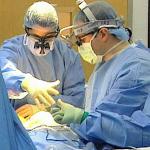2010-10-19

Photo: JAMA
Doctors at a VA hospital in Michigan operate after taking steps to communicate about the surgery and the patient
This is the VOA Special English Health Report.
No one wants a pilot to make a mistake. This is why flight crews are trained in teamwork and communication. Now a study finds hospitals that trained their operating room teams had a lower rate of surgical deaths than other hospitals.
SURGEON: "We'll need a patch in the room, is there a patch available?"
This team has been trained to communicate about the operation and the patient before, during and after the surgery.
SURGEON: "Are there any concerns or questions from the team? Anybody? No?"
The study involved more than one hundred American veterans hospitals. Some had taken part in a program of medical team training.
Researcher Julia Neily, a Veterans Administration nurse, says the training seeks to empower each team member, including technicians.
JULIA NEILY: "One of the key elements here was flattening the hierarchy in the operating room so that everybody, the scrub tech, the nurse, the surgeon, the anesthesiologist, whomever it is in the operating room could bring up any concerns they had about the patient."
And the more training, the better the chances that a patient would survive.
JULIA NEILY: "The group that had the training initially had a fifty percent greater reduction in their mortality rate and that was greater reduction than the control group, the group that didn't have the training initially."
Study co-author James Bagian is a Veterans Administration doctor.
JAMES BAGIAN: "Better communications by briefings and debriefings that are guided by checklists enhance teamwork."
DOCTOR: "Were there any difficulties or anything for anesthesia?"
ANESTHESIOLOGIST: "No."
The study is in this week's Journal of the American Medical Association.
At first, some team members questioned the value of the communication training. But another new study shows how a lack of communication can lead to mistakes like operating on the wrong site or the wrong patient.
Since two thousand four, hospitals and surgical offices in the United States have had a "universal protocol." For example, they are supposed to mark the surgical site and perform a "time-out" immediately before the procedure.
The study looked at records of a company that provides liability insurance to six thousand doctors in Colorado.
The doctors reported twenty-five cases involving the wrong patient between January of two thousand two and June of two thousand eight. Five patients suffered serious harm.
Surgeons and other doctors also reported one hundred seven cases involving the wrong site. More than one-third led to serious harm. One patient died.
The researchers blamed most of the wrong-site cases on errors in judgment or a lack of a time-out. But they say errors in communication were at least one cause of all the patient mix-ups involving the wrong patient.
Doctor Philip Stahel at the Denver Health Medical Center led the study in the Archives of Surgery.
And that's the VOA Special English Health Report, available online at 21voa.com. We are also on Facebook, Twitter, YouTube and iTunes at VOA Learning English. I'm Steve Ember.
___
Includes reporting by Carol Pearson and Avi Arditti, and sound provided by the Journal of the American Medical Association